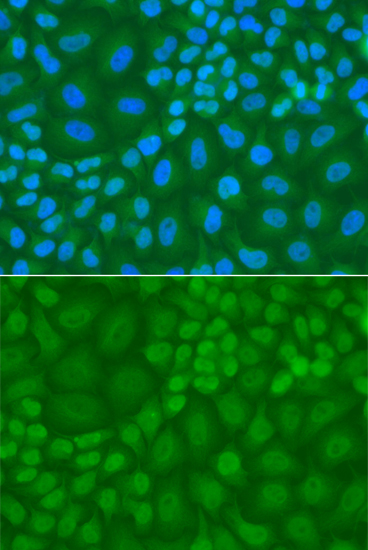-
Product Name
TDG Polyclonal Antibody
- Documents
-
Description
Polyclonal antibody to TDG
-
Tested applications
WB, IF
-
Species reactivity
Human, Mouse, Rat
-
Alternative names
TDG antibody; hTDG antibody; thymine DNA glycosylase antibody
-
Isotype
Rabbit IgG
-
Preparation
Antigen: Recombinant fusion protein containing a sequence corresponding to amino acids 141-410 of human TDG (NP_003202.3).
-
Clonality
Polyclonal
-
Formulation
PBS with 0.02% sodium azide, 50% glycerol, pH7.3.
-
Storage instructions
Store at -20℃. Avoid freeze / thaw cycles.
-
Applications
WB 1:500 - 1:2000
IF 1:50 - 1:200 -
Validations

Immunofluorescence - TDG Polyclonal Antibody
Immunofluorescence analysis of A549 cells using TDG antibody . Blue: DAPI for nuclear staining.
-
Background
DNA glycosylase that plays a key role in active DNA demethylation: specifically recognizes and binds 5-formylcytosine (5fC) and 5-carboxylcytosine (5caC) in the context of CpG sites and mediates their excision through base-excision repair (BER) to install an unmethylated cytosine. Cannot remove 5-hydroxymethylcytosine (5hmC). According to an alternative model, involved in DNA demethylation by mediating DNA glycolase activity toward 5-hydroxymethyluracil (5hmU) produced by deamination of 5hmC. Also involved in DNA repair by acting as a thymine-DNA glycosylase that mediates correction of G/T mispairs to G/C pairs: in the DNA of higher eukaryotes, hydrolytic deamination of 5-methylcytosine to thymine leads to the formation of G/T mismatches. Its role in the repair of canonical base damage is however minor compared to its role in DNA demethylation. It is capable of hydrolyzing the carbon-nitrogen bond between the sugar-phosphate backbone of the DNA and a mispaired thymine. In addition to the G/T, it can remove thymine also from C/T and T/T mispairs in the order G/T >> C/T > T/T. It has no detectable activity on apyrimidinic sites and does not catalyze the removal of thymine from A/T pairs or from single-stranded DNA. It can also remove uracil and 5-bromouracil from mispairs with guanine.
Related Products / Services
Please note: All products are "FOR RESEARCH USE ONLY AND ARE NOT INTENDED FOR DIAGNOSTIC OR THERAPEUTIC USE"
